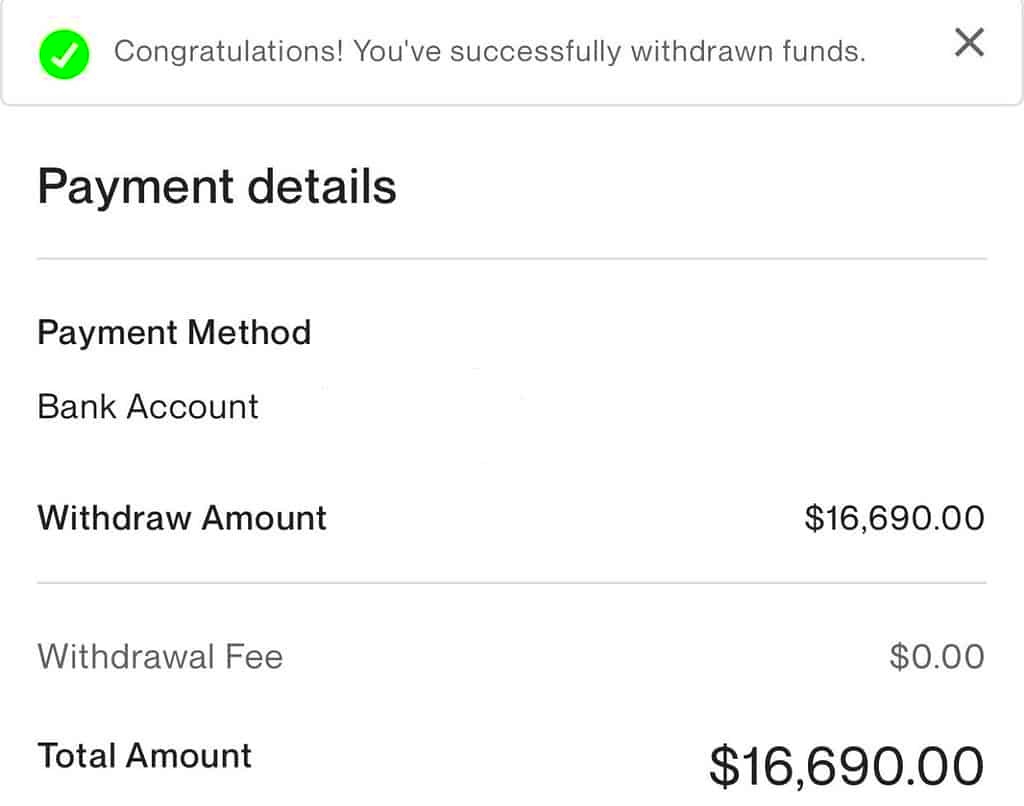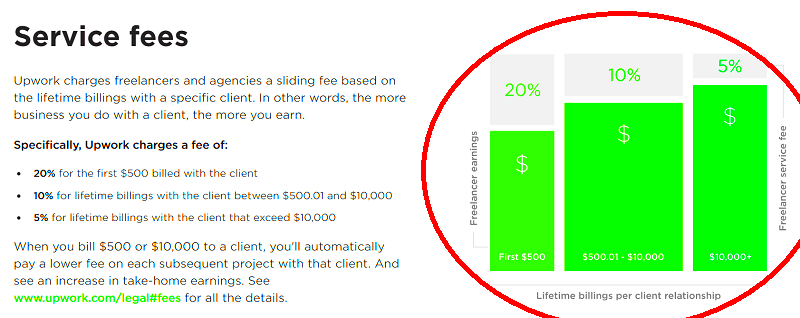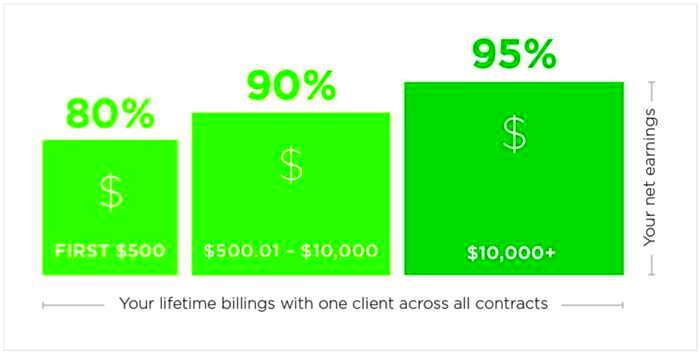Upwork is one of the largest platforms for freelancers worldwide. It connects talented individuals with clients looking for various services, from writing and design to programming and marketing. As a freelancer on Upwork, one of the most important things to understand is how much you can earn and what factors influence your pay. In this section, we will discuss how Upwork pays freelancers and what you can expect when you begin working on the platform. Whether you're just starting or you're an experienced freelancer, knowing how Upwork's payment system works is key to maximizing your earnings.
Factors Influencing Upwork Freelance Earnings

There are several factors that can influence how much you earn as a freelancer on Upwork. Understanding these factors can help you set realistic expectations and improve your chances of earning more. Some of the main factors include:
- Skillset and Experience: Freelancers with specialized skills or more experience can charge higher rates.
- Project Type: Some jobs, such as those requiring advanced technical skills, tend to pay more than others.
- Client Budget: Clients set their budgets, and this can determine how much you can earn from a project.
- Location: Upwork takes location into account when setting rates. Some regions have higher earning potential due to demand for specific skills.
- Reputation and Rating: Freelancers with good reviews and a strong reputation on Upwork can charge higher rates.
By considering these factors, you can position yourself to earn more and grow your freelance business on Upwork.
Also Read This: What Mac Pays Freelancers
How Upwork Payment Structure Works

Upwork has a clear payment structure that makes it easy for freelancers to get paid for their work. There are two primary ways freelancers are paid on the platform: hourly and fixed-price contracts.
Hourly Contracts: When you work on an hourly basis, Upwork uses a time-tracking tool called the Upwork Desktop App. This app records the hours you work and ensures you are paid for the exact amount of time you’ve spent on a project. Clients are billed weekly, and freelancers get paid on a bi-weekly schedule.
Fixed-Price Contracts: With fixed-price contracts, clients agree to pay a set amount for a specific project or milestone. Freelancers are paid based on the completion of the project or the agreed milestones. Payments are made after the work is submitted and approved by the client, and freelancers can withdraw funds once they’re available in their account.
Upwork Fees: Upwork charges a service fee on all payments, which decreases as you earn more from the same client. Here's a breakdown of the fees:
| Amount Earned | Service Fee |
|---|---|
| Up to $500 | 20% |
| $500.01 to $10,000 | 10% |
| Over $10,000 | 5% |
By understanding how the payment structure works and managing your contracts effectively, you can ensure timely payments and minimize unnecessary fees. Make sure to track your hours accurately and keep a professional relationship with your clients to help boost your reputation and earnings.
Also Read This: Best Fiverr Sellers for E-commerce Solutions in 2024
Average Freelance Pay on Upwork by Job Category

The average pay on Upwork varies widely depending on the job category, the complexity of the task, and the freelancer’s experience. Different fields have different pay scales, so understanding what to expect can help you determine the right rate for your services. Below are some of the most common job categories on Upwork and the typical pay rates freelancers can expect:
- Web Development: Freelancers in web development can earn anywhere from $25 to $100+ per hour, depending on their expertise and the type of project. For example, front-end developers may charge $30–$60/hour, while full-stack developers could earn $50–$100/hour.
- Design and Creative: Graphic designers, logo creators, and illustrators typically earn between $20 and $70 per hour. Experienced designers or those with a strong portfolio may charge higher rates for specialized design work.
- Writing and Content Creation: Content writers, copywriters, and bloggers generally earn between $15 and $50 per hour. Niche experts, such as technical writers or copywriters for marketing campaigns, can earn more, with rates ranging from $40 to $100 per hour.
- Marketing and Sales: Freelancers working in SEO, social media management, or digital marketing can expect to earn between $25 and $75 per hour, depending on the skill set and experience.
- Virtual Assistance: Virtual assistants typically charge between $10 and $30 per hour, with higher rates for specialized tasks like executive assistance or project management.
Understanding these averages can help you set competitive rates and decide on your pricing strategy when starting out or negotiating with clients.
Also Read This: Steps to Becoming a Freelance Voice-Over Artist
Understanding Upwork Fees and Charges

When working on Upwork, it's essential to know the fees that will be deducted from your earnings. Upwork charges freelancers a service fee based on the total amount you earn from each client. The more you work with a specific client, the lower the fee you’ll pay. Here’s a breakdown of Upwork’s fee structure:
| Amount Earned from Client | Service Fee |
|---|---|
| Up to $500 | 20% |
| $500.01 to $10,000 | 10% |
| Over $10,000 | 5% |
Withdrawal Fees: When you withdraw your earnings, there may also be withdrawal fees depending on the method you choose. For example, PayPal charges a fee, while direct bank transfers may have different rates depending on your country.
Transaction Fees: There is a 2.75% fee for each payment processed through Upwork. However, this fee does not apply if the client pays through an hourly contract.
It's important to account for these fees when setting your rates to ensure that your take-home pay meets your expectations. Keeping track of your earnings and fees can also help you make informed decisions when working with clients.
Also Read This: How to Edit a Review on Fiverr
How to Increase Your Earnings on Upwork
Increasing your earnings on Upwork requires a combination of strategy, skill, and building a strong reputation on the platform. Here are some tips to help you grow your freelance business and earn more:
- Specialize in a Niche: The more specialized your skill set, the more you can charge. Clients are often willing to pay a premium for expertise in a particular area. For example, instead of offering generic writing services, you could focus on technical writing or SEO-focused content.
- Build a Strong Profile: Your Upwork profile is your first impression, so make sure it’s complete, professional, and showcases your skills and experience. A well-written profile can help you stand out from other freelancers.
- Get Client Reviews: Positive reviews can significantly impact your earning potential. After completing a project, kindly ask clients to leave feedback. A strong rating increases your visibility and credibility, making you more attractive to potential clients.
- Set Competitive Rates: Research the going rates for your skillset and experience level. As a new freelancer, you might need to start with lower rates to attract clients, but you can gradually raise your prices as you build your portfolio and reputation.
- Focus on Long-Term Clients: Rather than chasing one-off projects, aim to build long-term relationships with clients. This can help provide a steady stream of income, reduce the time spent on acquiring new clients, and increase your earning potential over time.
- Work Efficiently: The more efficient you are, the more projects you can take on, which translates to more earnings. Use tools and techniques to manage your time effectively and deliver high-quality work quickly.
By following these tips and focusing on delivering high-quality work, you can increase your chances of earning more on Upwork and growing your freelance career.
Also Read This: How Much Do Graphic Designers Earn on Fiverr?
Frequently Asked Questions
Many freelancers new to Upwork have common questions about the platform, payment methods, and ways to succeed. Here are answers to some frequently asked questions:
- How does Upwork handle payments?
Upwork provides a secure payment system that ensures freelancers get paid for the work they complete. For hourly contracts, Upwork's time-tracking software records hours worked, while fixed-price contracts use milestones that are paid upon approval by the client.
- When will I receive my payment?
Payments for hourly contracts are processed weekly, while fixed-price payments depend on milestone completion and client approval. Once funds are available, freelancers can withdraw them using methods like PayPal, direct bank transfer, or other payment options.
- What are Upwork’s service fees?
Upwork charges a tiered service fee based on your earnings with each client. The rate is 20% for earnings up to $500, 10% for earnings from $500.01 to $10,000, and 5% for any amount above $10,000.
- Can I negotiate rates with clients?
Yes, freelancers can negotiate their rates with clients on Upwork. Many clients are open to discussing rates, especially if you have a strong portfolio or unique skills that meet their needs.
- How do I find high-paying clients on Upwork?
To attract high-paying clients, focus on creating a professional profile, getting positive reviews, and specializing in a niche skill. Building a good reputation and seeking long-term projects with established clients can also lead to higher-paying opportunities.
Conclusion
Understanding Upwork’s payment structure, fees, and earning potential can help you make the most of your freelance career. By managing fees, focusing on high-quality work, and aiming to build long-term client relationships, you can increase your earnings and achieve success on Upwork.




